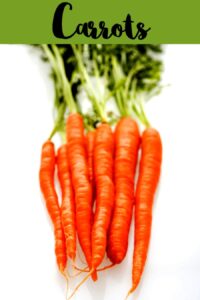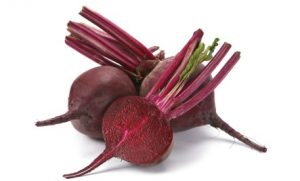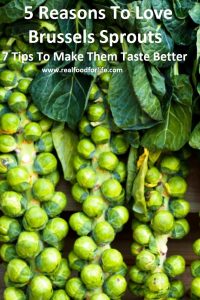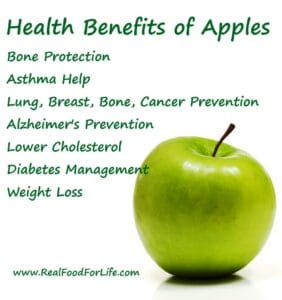While we slow down and rest this winter, let’s enjoy these tasty, nourishing winter vegetables and fruits. Eating vegetables in the right season ensures optimum nutrients and health benefits for our body.

Food out of season lacks energy and nutrients because it has been shipped from far away and is often cultivated unnaturally. In the northern hemisphere, it is winter, our gardens are frozen and covered with snow. When we don’t grow food, how can we eat food that’s in season?
Many vegetables ripen in the fall and store well over the winter. The earth created them to help us to stay nourished in the cold months. Go to your local farmer’s market; even in the winter, they have harvested food to sell. I have eaten fresh vegetables and fruits from my garden right up until the end of March, which is usually when I run out of them.
 1. Carrots
1. Carrots
They are loaded with the antioxidant beta-carotene, which converts to Vitamin A and is essential for healthy eyes and a strong immune system, which is a good thing in the winter. This crunchy superfood has a host of health benefits. It is a tasty winter vegetable.
Add carrots to your meals: Grate them into salads, put them in soups, stews, and stir-fries.

2. Winter Squash
This is a vegetable that comes in a variety of shapes and flavours; a few examples are corn, butternut, kabocha, and delicata squash which are  all sweet-flavoured. Winter squash has a high amount of Vitamin A (beta-carotene), potassium, dietary fiber, and manganese. Learn more about the health benefits of Squash.
all sweet-flavoured. Winter squash has a high amount of Vitamin A (beta-carotene), potassium, dietary fiber, and manganese. Learn more about the health benefits of Squash.
Add the sweetness of winter squash to your meals: Simply steam or bake squash to make a delicious squash soup.
 3. Beets
3. Beets
They are sweet and delicious and their deep red makes a colourful addition to any meal as one of the winter vegetables. A single serving of beets can boost your energy and lower your blood pressure. Beets are full of health benefits and are known as an aphrodisiac, a brain Booster, and more.
Add deep red beets to your meals: Put them in soups and stews or grate them into a salad.
 4. Sweet Potatoes
4. Sweet Potatoes
This vegetable is one of the most delicious winter vegetables. They have a lower glycemic index than white potatoes, which is surprising since they are so sweet. That means they are less likely to produce insulin. Sweet potatoes are a smart carb, very rich in vitamins and minerals, and they provide many health benefits.

Add tasty sweet potatoes as a winter vegetable to your meals.
Here are two recipes Baked Sweet Potatoes with Pecans Sweet Potato Salad.
5. Onions
 They are so good for you and are full of protective phytonutrients, vitamins, trace minerals, and unique anti-inflammatory compounds. Onions are full of health benefits as they are rich in nutrients, antioxidants and high in quercetin, which
They are so good for you and are full of protective phytonutrients, vitamins, trace minerals, and unique anti-inflammatory compounds. Onions are full of health benefits as they are rich in nutrients, antioxidants and high in quercetin, which

protects against heart disease, stroke, and certain types of cancer.
Add onions to your meals: They add flavour to your meals for example in soups, stews, stir-fries, and red onion in a salad. They are a great winter vegetable. Enjoy a Vegan Onion Soup for Dinner or Lunch
Please Note: The next are three vegetables from the cruciferous family. If you’re taking blood-thinners, it’s important to monitor the foods you eat containing vitamin K, which these next three have. Vitamin K aids in blood clotting.
Cruciferous vegetables which include: Brussels sprouts, cabbage, broccoli, cauliflower, kale, bok choy, turnips, arugula, and watercress, have been found to cause hypothyroidism. A study found that eating 7 – 8 cooked Brussels sprouts for four weeks did not affect thyroid function. Still, more research is needed. It has been said that it is best to cook them as that would eliminate the problem.
 6. Cabbage
6. Cabbage
This budget-friendly vegetable is filled with vitamins and minerals, fiber, antioxidants, and glucosinolates that studies show to lower the risk of cancer. Also, there are only 33 calories in a cup of cooked cabbage. There are many Surprising Health Benefits of Cabbage.
Add cabbage to your meals: Make coleslaw, add a few leaves for a crunch to salads, and add chopped leaves to stews, soups, or stir-fries. Another of the winter vegetables.
 7. Kale
7. Kale
This is one of the few leafy greens that survives and improves its flavour after the frost, making it a dense wintergreen. Dark greens are the most nutritious. Kale is full of vitamins and many minerals and has many Health Benefits.
Add Kale to your meals: Simply steam it and add a little lemon juice or add it to soups or stews.
 8. Brussels sprouts
8. Brussels sprouts
They look like mini cabbages but have their unique flavour. Brussels sprouts are one of the top 20 most nutritious foods. Brussels sprouts have so many health benefits for your body.
Add Brussels sprouts to your meals: Here are two tasty recipes:

Roasted Brussels Sprouts with Pecans and Cranberries.
Let’s eat these vegetables that are in season and deeply nourish our bodies. They are nature’s Superfoods.
Now here are the two main fruits for winter.
 9. Apples
9. Apples
An Apple a Day? Learn 8 Reasons WHY to Eat One
They are filled with soluble fiber (5 grams) This fiber has been shown to reduce intestinal disorders, including diverticulitis, hemorrhoids, and possibly some types of cancer.
Apples help control insulin levels by releasing sugar slowly into the bloodstream.
Cleanses and detoxifies, which helps eliminate heavy metals such as lead and mercury.
 10. Bananas
10. Bananas
Are Healthy, Silly Sexy, And of Course So Yummy
Bananas are healthy for you and that’s a good thing since they are the most popular fruit in North America. Everyone loves bananas. There are more songs, jokes, and silliness with this food than with any other plant on earth. They are Superfoods!
1 cup of bananas has 800 mg of potassium. Most Americans have an imbalanced sodium/potassium balance which is correlated with hypertension, heart disease, and diabetes.
 Have a Healthy Winter and Be Strong With These Tips
Have a Healthy Winter and Be Strong With These Tips
It is possible to be strong and warm even in the winter. Here are some easy tips to help you understand what is happening and how to be healthy.
Many of us notice an increase in problems like dry skin, body pains, lethargy, coughs, flu, and even depression. We need a seasonal way of looking after our bodies to maintain good health.
You can learn how to plan and prepare super winter healthy meals with my Winter 2-5-30 Healthy Diet

